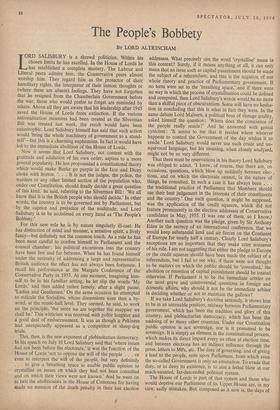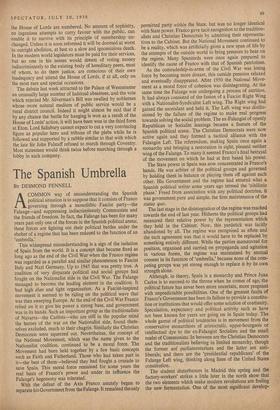The People's Bobbety
BY LORD ALTRINCHAM IL, ORD SALISBURY is a shrewd politician. Within his chosen limits he has excelled. In the House of Lords he has established a complete mastery. The Labour and Liberal peers admire him; the Conservative peers almost worship him. They regard him as the protector of their hereditary rights, the interpreter of their inmost thoughts or (where these are absent) .feelings. They have not forgotten that he resigned from the Chamberlain Government 'before the war; those who would prefer to forget are reminded by others. Above all they are aware that his leadership after 1945 saved the House of Lords from extinction. If the various nationalisation measures had been treated as the Silverman Bill was treated last week, the result would have been catastrophic. Lord Salisbury himself has said that such action would 'bring the whole machinery of government to a stand- still'—but this is a charming euphemism. In fact it would have led to the immediate abolition of the House of Lords.
Now it seems that Lord Salisbury, not content with the gratitude and adulation of his own order, aspires to a more general popularity. He has propounded a constitutional theory which would make Burke go purple in the face and Dicey choke with horror. `. . . It is not the judges, tbe police, the warders or any other limited section of the population who, under our Constitution, should finally decide a great question of this kind,' he said, referring to the Silverman Bill: 'We all know that it is the British people who should decide.' In other words, the country is to be governed not by Parliament, but by the caprice and prejudice of the multitude; and Lord Salisbury is to be acclaimed on every hand as 'The People's Bobbety.'
For this new role he is by nature singularly ill-cast. He has distinction of mind and manner, a sensitive spirit, a lively fancy—but definitely not the common touch. As a rule he has been most careful to confine himself to Parliament and the council chamber : his political excursions into the country have been few and far between. When he has found himself under the necessity of addressing a large and representative British audience the effect has not always been fortunate. I recall his performance at the Margate Conference of the Conservative Party in 1953. At one moment, imagining him- self to be in his familiar setting, he let slip the words 'My Lords,' and then added rather lamely, after a slight pause, 'Ladies and Gentlemen.' On the same occasion he attempted to ridicule the Socialists, whose dissensions were then a by- word, at the music-hall level. They seemed, he said, to work on the principle, 'the more we are together the snappier we shall be.' This witticism was received with polite laughter and a good deal of embarrassment. It was as though ,a, Pekinese had unexpectedly appeared as a competitor in sheep-dog trials.
This, then, is the new exponent of plebiscitarian democracy.
• In his speech on July 10 Lord Salisbury said that 'where issues had not been before the electorate,' it was the function of the House of Lords 'not to oppose the will of the people . . . or even to interpret the will of the people, but very definitely . . . to give a breathing space to enable public opinion to crystallise on issues oh which they had not been consulted and on which their views were not known.' And he went on to twit the abolitionists in the House of Commons for having made no mention of the death penalty in their last election addresses. What precisely can the word 'crystallise' mean in this context? Surely, if it means anything at all, it can only mean that an issue such as capital punishment should be made the subject of a referendum; and this is the negation of our whole theory and practice of Parliamentary government. If no term were set to the 'breathing space,' and if there were no way in which the process of crystallisation could be defined and computed, then Lord Salisbury's words would be no more than a skilful piece of obscurantism. Some will have no hesita- tion in concluding that this is what in fact they were. In the same debate Lord Malvern, a political boss of vintage quality, asked himself the question : 'Where does the conscience of the people really reside?' And he answered with genial cynicism : 'It seems to me that it resides where whoever happens to control the Government of the day wishes it to reside.' Lord Salisbury would never' use such crude and un- equivocal language; but his meaning, when closely analysed. might not be so very different.
That there must be reservations in his theory Lord Salisbury was obliged to admit. 'I know, of course, that there are, on occasions, questions, which blow up suddenly between elec- tions, and on which the electorate cannot, in the nature of things, be consulted. In such a case it has always been . . . the traditional practice of Parliament that Members should use their best judgement in the interests of their constituents and the country.' One such question, it might be supposed, was the application of the credit squeeze, which did not feature prominently in the election addresses of Conservative candidates in May, 1955. (I was one of them, so I know.) Another such question was the pledge, given by Sir Anthony Eden in the secrecy of an international conference, that we would keep substantial land and air forces on the Continent of Europe for nearly half a century. Clearly Lord Salisbury's exceptions are so important that they make utter nonsense of his rule. I am not suggesting that either the pledge to Europe or the credit squeeze should have been made the subject of a referendum, but I fail to see why, if these were not thought to be matters on which the public should be 'consulted,' the abolition or retention of capital punishment should be treated otherwise. If Parliament is to be the immediate arbiter on the most grave ahd controversial questions in foreign and domestic affairs, why should it not be the immediate arbiter in deciding whether or not to maintain the gallows?
• If we take Lord Salisbury's doctrine seriously, it shows him to be in an untenable position, midway between Parliamentary government, which has been the tradition and glory of this country, and plebiscitarian democracy, which has been the undoing of so many other countries. Under our Constitution public opinion is not sovereign, nor is it presumed to be sovereign. It is simply an element in the constitutional process,• which makes its direct impact every so often at election time, and between elections has an indirect influence through the press, letters to MPs, etc. The duty of governing, and of giving a lead to the people, rests upon Parliament, from which even the so-called Government is only an emanation. To evade that duty, or to deny its existence, is to aim a lethal blow at our much-vaunted, far-descended political system.
The House of Lords is part of that system and those who would deprive our Parliament of its Upper:House are, in my view, sadly mistaken. But, composed as it now is, the days of the House of Lords are numbered. No amount of sophistry, no ingenious attempts to curry favour with the public, can enable it to survive with its principle of membership un- changed. Unless it is soon reformed it will be doomed at worst to outright abolition, at best to a slow and ignominious death. In the modern world legislators must be paid for their services, but no one in his senses would dream of voting money indiscriminately to the existing body of hereditary peers, most of whom, to do them justice, are conscious of their own inadequacy and attend the House of Lords, if at all, only on the most rare and special occasions.
The debate last week attracted to the Palace of Westminster an unusually large number of habitual absentees, and the vote which rejected Mr. Silverman's Bill was swelled by noblemen whose more natural medium of public service would be a rural district council. Indeed it might almost be said that if by any chance the battle for hanging is won as a result of the House of Lords' action, it will have been won in the third form at Eton. Lord Salisbury cannot expect to cut a very convincing figure as popular hero and tribune of the plebs while he is followed and supported by a rabble similar to that with which the late Sir John Falstaff refused to march through Coventry. Most statesmen would think twice before marching through a lobby in such company.



















































 Previous page
Previous page